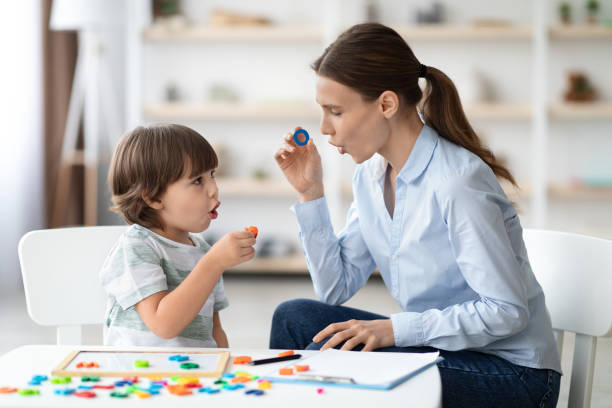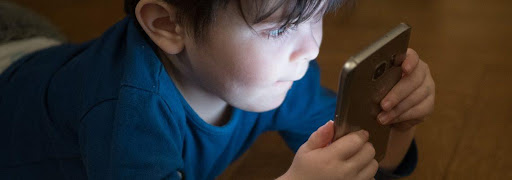Newsletter
Subscribe to stay updated on our latest news, upcoming workshops, training and special offers
.jpg)
Speech disorders are a common condition in children with an estimated 2-3% of all school-aged children suffering from it. They can affect the child's ability to communicate, both verbally and non-verbally.
There are many types of speech disorders that can be identified in children. Some of the most common ones are:
-Stuttering -Slurring words together -Frequent pauses or breaks during speech
-Voicing difficulties
-Lack of clarity and articulation
-Excessive nasality or throatiness in voice
-Inappropriate pitch and tone in voice
Causes Of Speech Disorders in Children
The causes of speech disorders in children are varied. Some of the common causes are genetic, environmental, neurological and developmental.

As a parent or teacher, it is important to be aware of the various factors that can cause speech disorders in children. This will help you identify any potential problems early on and take appropriate action.
Some of the common causes of speech disorders in children are:
-Brain Damage (head injury, tumor, stroke, or any other severe disease)
-Vocal Cord Damage (excessive voice use during speaking, coughing, or shouting)
-Vocal cord paralysis (cancer, infection, nerve damage)
-Muscle and respiratory weakness
-Frequent ear infections
-Birth defects such as cleft palate
What is speech therapy and how can speech therapy help your child?
Speech Therapy plays an important role in the treatment of speech disorders. The goal of speech therapy is to improve the your child’s ability to use language. Pediatric speech therapists help children use language in the most effective way possible. They also teach children how to communicate more effectively with others.
Speech therapists work one-on-one with children in order to identify and treat any problems that may be affecting their ability to speak or understand others. They may also work with parents and caregivers of children who have speech disorders or are at risk for developing one.
Your child can benefit from speech therapy in the following ways:
-Improved communication skills
-Improved self-esteem
-Improved social interaction
-Reduced frustration levels
-Improved academic performance
How to understand if your child requires speech therapy
Speech therapy helps kids communicate more effectively, develop their social skills, and increase their ability to function in daily life. If you notice any of the following, chances are that your child could benefit from speech therapy.
-Difficulty pronouncing words the way you would expect for their age
-Stutters while speaking
-Has difficulty interacting with other children
-Your child has a cleft palate or other structural problems with the mount
Your child doesn’t speak at all
-Your child has several ear infections
-Does not babble (4-7 months) or use gestures (7-12 months)
-Has problems with reading and writing

Alternatively, If your child has already been diagnosed with any of the conditions listed below, speech therapy can be necessary. It is always advisable to speak with a speech therapist as soon as you receive a diagnosis.
1. Articulation disorders- Children with articulation disorders have trouble making sounds with their mouths. It includes omitting or elevating certain sounds from words, such as using "oes" in place of "shoes."
2. Dysarthria- When the speech-making muscles weakens or become difficult to control, it can cause dysarthria. Your child could find it challenging to speak or may not be able to speak at all. It's also possible that others won't recognize what your child is saying.
3. Receptive language disorder- It is challenging for children with receptive language disorder to comprehend what others are saying. Children who struggle with this disorder may find it challenging to communicate their emotions and comprehend written material.
4. Aphasia- Damage to the language-related areas of the brain causes the disorder ‘aphasia’. It may result from a tumor, infection, stroke, or head injury.
5. Apraxia- Speaking is challenging for children diagnosed with ‘apraxia’. A person with this illness has problem communicating clearly and consistently.
6. Cognitive-communication disorders- A stroke, tumor, brain injury, or other neurological illness can cause cognitive-communication disorders. A person with this illness has trouble expressing their thoughts.
7. Resonance disorder- When the normal airflow in the nasal passages is blocked, the voice's vibrational pattern changes, resulting in a resonance disorder. It has an impact on speech during communication.
What happens during speech therapy?
To encourage language development in children, language-based modules are typically chosen, which include playing and conversing as well as engaging images, or books. These exercises are intended to make the class interesting while also being enlightening.
In order to develop the mouth muscles and increase the child's oral awareness, the therapist may also have them perform oral exercises or work with various food textures to strengthen the child's oral muscles. The therapist may also recommend mouth and jaw exercises to help them build their muscles and communicate more effectively. Exercises involving sound production or articulation are frequently used in therapy for children. Age-appropriate play is a great way to educate a child how to make various sounds by modelling the right syllables and sounds for the child.
What is the prognosis?
The long-term outlook is better for those children who get treatment early. Early intervention can stop a speech issue from getting worse. The prognosis for children with chronic disabilities depends on how severe the disability is..
To speak to a qualified speech therapist at Hopscotch Child Therapy, click here
August 9, 2022

August 24, 2022

September 30, 2020
.jpg)
August 9, 2022